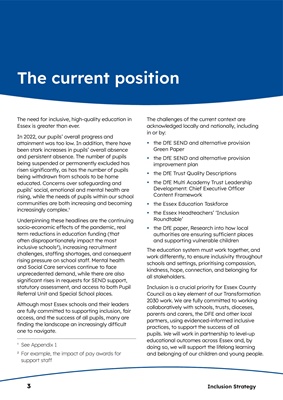
3 Inclusion Strategy
The current position
The need for inclusive, high-quality education in
Essex is greater than ever.
In 2022, our pupils' overall progress and
attainment was too low. In addition, there have
been stark increases in pupils' overall absence
and persistent absence. The number of pupils
being suspended or permanently excluded has
risen significantly, as has the number of pupils
being withdrawn from schools to be home
educated. Concerns over safeguarding and
pupils' social, emotional and mental health are
rising, while the needs of pupils within our school
communities are both increasing and becoming
increasingly complex.1
1 See Appendix 1
Underpinning these headlines are the continuing
socio-economic effects of the pandemic, real
term reductions in education funding (that
often disproportionately impact the most
inclusive schools2
2 For example, the impact of pay awards for
support staff
), increasing recruitment
challenges, staffing shortages, and consequent
rising pressure on school staff. Mental health
and Social Care services continue to face
unprecedented demand, while there are also
significant rises in requests for SEND support,
statutory assessment, and access to both Pupil
Referral Unit and Special School places.
Although most Essex schools and their leaders
are fully committed to supporting inclusion, fair
access, and the success of all pupils, many are
finding the landscape an increasingly difficult
one to navigate.
The challenges of the current context are
acknowledged locally and nationally, including
in or by:
y the DfE SEND and alternative provision
Green Paper
y the DfE SEND and alternative provision
improvement plan
y the DfE Trust Quality Descriptions
y the DfE Multi Academy Trust Leadership
Development: Chief Executive Officer
Content Framework
y the Essex Education Taskforce
y the Essex Headteachers' 'Inclusion
Roundtable'
y the DfE paper, Research into how local
authorities are ensuring sufficient places
and supporting vulnerable children
The education system must work together, and
work differently, to ensure inclusivity throughout
schools and settings, prioritising compassion,
kindness, hope, connection, and belonging for
all stakeholders.
Inclusion is a crucial priority for Essex County
Council as a key element of our Transformation
2030 work. We are fully committed to working
collaboratively with schools, trusts, dioceses,
parents and carers, the DFE and other local
partners, using evidenced-informed inclusive
practices, to support the success of all
pupils. We will work in partnership to level-up
educational outcomes across Essex and, by
doing so, we will support the lifelong learning
and belonging of our children and young people.